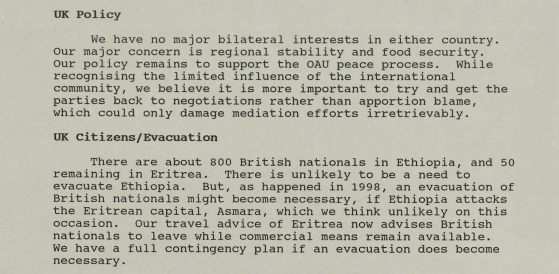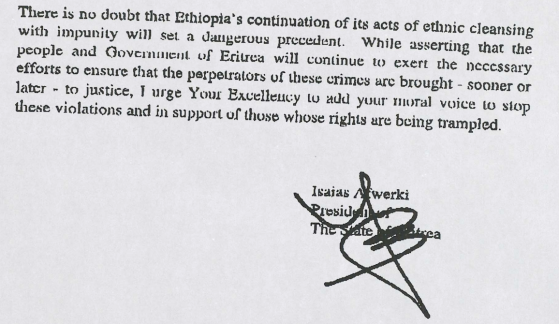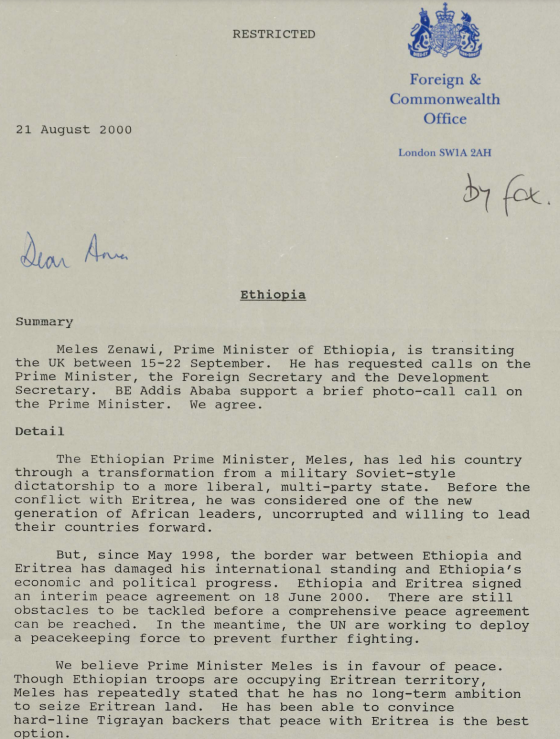British Archives reveal Tony Blair’s stand on the Ethiopia-Eritrea border war
2023-01-02 12:10:02 Written by Martin Plaut Published in English Articles Read 1534 times
At first glance the papers seem almost bland, yet what gradually becomes clear are the foundations for the firm friendship that Blair developed with Meles Zenawi, and how Isaias Afwerki failed to win the battle for influence. The war that Ethiopia and Eritrea fought from 6 May 1998 – 18 June 2000, apparently over the border town of Badme, took the lives of at least 100,000. It was resolved by the Algiers peace agreement, which was mainly brokered by the United States. But it is only now that the British national archive has released papers revealing the role of that the British Prime Minister, Tony Blair. At the start of the war the Blair government was not very engaged in the conflict. As one Foreign Office briefing makes clear, Britain had little interest in either country. London's concern was the safety of its citizens, some of whom were airlifted out of Asmara when the war broke out. Instead, the Blair government supported the efforts of others: the Organisation of African Unity and the US government. But there are elements of London's interaction with both countries that are interesting. Isaias Afwerki and Meles Zenawi both did their best to win British support for their cause, sending personal letters to Prime Minister Blair. Isaias argued against the deportation of thousands of Eritreans who were forced to leave Ethiopia. But his case was undermined by his failure to acknowledge that thousands of Ethiopians had been expelled from Eritrea, even though the British accepted that they were not as numerous as the Eritreans who had been put across the Ethiopian border. The letters from Meles also called for British support, but the UK refused to take sides. On 5th of June 1998, within days of the war breaking out, the Foreign Office provided this assessment of how the conflict had broken out. That was the position that Britain maintained throughout the conflict. But being less compromising did not win Isaias international support. Eritrea gradually lost ground with the Blair government. This was perhaps inevitable; London was always likely to favour Ethiopia, since it was the major power in the region and had greater clout. But Isaias played his cards badly. He was seen as intransigent, and he also refused to take the call of the British Foreign Secretary, Robin Cook in June 1998, who had meanwhile spoken to Meles. It was a point Tony Blair highlighted. Perhaps President Isaias thought it was beneath him to speak to a mere Foreign Secretary (the British term for a Minister) but it did not go down well. In May 2000 the Foreign Office was sticking to its position of favouring neither side - labelling both as authoritarian regimes in the Marxist mold. The assessment was not far from the mark. Eritrea's survival was indeed at stake, after Ethiopian forces broke through the Eritrean defences. But in just three months, the British tone towards Ethiopia changed completely. An opportunity of a visit to London by Meles offered Tony Blair the chance of a real role in ending the war. The Foreign Office suggested it should be seized. There appears to have been a reversal of British policy. No longer is Ethiopia seen as a state "reminiscent of Eastern Europe in the 1970's". Meles is portrayed as a peacemaker resisting "hard-line Tigrayan" backers, rather than part of an elite with little concern for the majority of his people. Although the file released by the National Archive gives no further clues about how the change came about, or what happened to the proposed visit to London, it would seem that the Blair-Meles relationship was sealed. The two men became firm allies. Meles Zenawi went on to sit on the Blair "Commission for Africa" as a Commissioner. When Blair finally left office in 2007 Meles praised the former Prime Minister in no uncertain terms. “I doubt whether Africa has had a more sincere friend at 10 Downing Street than Tony Blair,” Meles said. The seeds of this relationship seem to have been sown in the unpromising soil of the border war. In time we may come to understand how they were planted and who tended their green shoots. This file provides the first glimpse. |




























